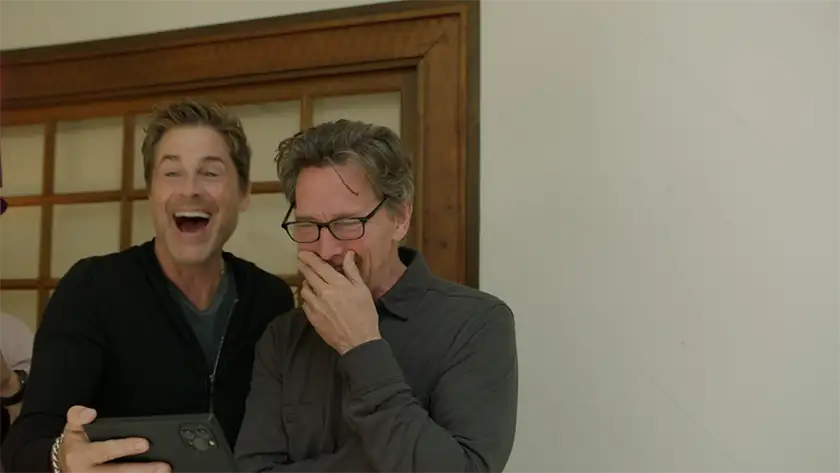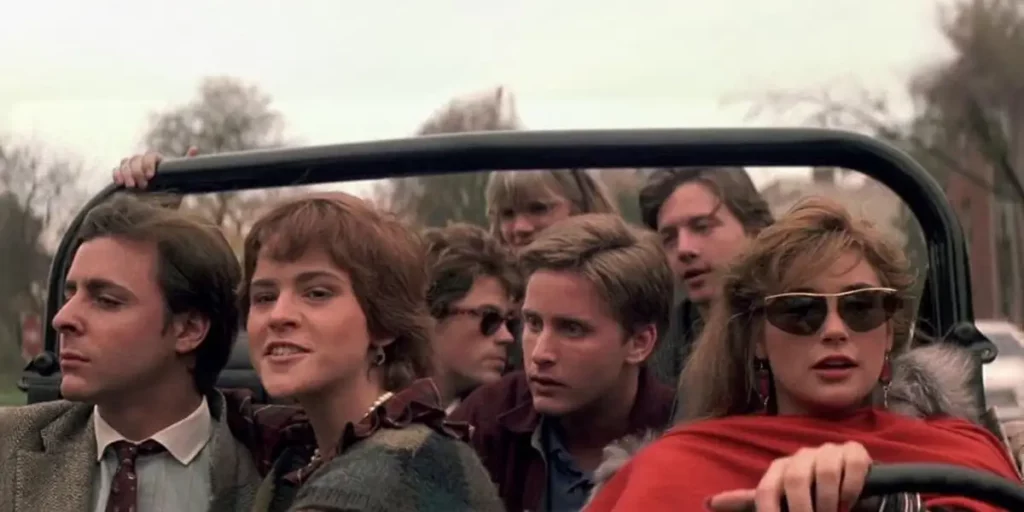With Brats, Andrew McCarthy pulls back the curtain on the damming “Brat Pack” label given to the rising stars of the 1980s film scene.
Director: Andrew McCarthy
Genre: Documentary
Run Time: 92′
Tribeca Premiere: June 7-10, 2024
Release Date: June 13, 2024 on Where to Watch Brats: Hulu
In the 1980s, John Hughes’ movies reigned supreme. His films focused on high school kids and young adults trying to find their identity in a society obsessed with labels condemning them as one-dimensional characters. With the success of his films came the rise of an entirely new generation of young actors who frequently starred in more than one of Hughes’ films, or films exploring similar themes.
The irony baked into the recurring actors of these films going on to suffer the same fate as the characters they portrayed is truly prolific and the focus of Andrew McCarthy’s insightful documentary Brats.
On June 10th, 1985 an article by journalist David Blum graced the front page of New York magazine. Blum’s article was intended to be a profile on Emilio Estevez, who was one of the hottest actors in town, coming off the success of Repo Man, The Breakfast Club and doing press in anticipation of the release of St. Elmo’s Fire. However, instead of profiling one of Hollywood’s most promising young actors, Blum wrote an article tearing Estevez and his closest peers to pieces, painting them as untalented party boys who couldn’t care less about creating true art.
Within this article, Blum coined the infamous nickname for the young actors of the 1980s who frequently collaborated together: the “Brat Pack”. Playing off the infamous “Rat Pack” of the 1950s and ’60s, Blum wrote a scathing exposé on the antics of the hottest young men in Hollywood painting the up-and-coming generation of actors as arrogant, overly competitive and ultimately unserious.
The “Brat Pack” title caught fire, becoming an unofficial club for the most exciting actors gracing the screen. Growing up in the ‘80s, everyone wanted to be them, date them or know them. If you were deemed a member, you were officially cemented as one of the golden kids of Hollywood. However, just as easily as the label helped stars rise, it also caused them to fall. The label stretched to encompass all the actors who starred in St. Elmo’s Fire, as that is what the original profile was supposed to be written in promotion for. One of these actors was Andrew McCarthy, who, after 30-plus years, has reconnected with the original “Brat Pack” members to look at how this article and this label changed the trajectory of their lives.

McCarthy does a really impressive job recreating the hype surrounding this young group of actors in a way that allows younger, and potentially unfamiliar, audiences to understand just how big of a cultural moment in time this was. He doesn’t deny there were pay offs to this title at times and being “in” the Brat Pack was a coveted spot, as confessed by actors like John Cryer, who were always on the fringes of it. The pacing of the film, and specifically the archival footage, is expertly used here.
Flashes of positive interviews praising these actors labeled wunderkinds, highly flattering conversations about their talents and mass hysteria whenever they would make public appearances. McCarthy shows how this label skyrocketed them into a new stratosphere of success initially. But he then begins the descent into its reality, showing the positives of being a part of this group were enjoyed very sparingly.
The subject is a tough one to broach, which McCarthy is highly conscious of, as this title both cemented the fame of these young actors and also gave them this identity of ungrateful, bratty kids with no respect for the industry they were working in. The article David Blum wrote was not just unkind, it was a personal attack on the biggest stars in the world at the time he wrote it. McCarthy’s focus within the film is the ways in which this title completely and totally stripped the members of this so-called group of their own identity and the ability to exist outside of it.
However, this is where the most shocking revelation comes: none of it was ever real. While these actors did work together on a few occasions, McCarthy reveals it was not like they really hung out outside of working situations. While there didn’t seem to be issues on set, out in the real world these actors were constantly being pit against each other and once this label of the Brat Pack was put out there, none of the members wanted to work together anymore.
In McCarthy’s conversation with Estevez, the two of them address the fact they haven’t spoken in nearly 30 years, due to a fallout over Estevez refusing to star in a film with McCarthy in fear of the film not being taken seriously and deemed just another “Brat Pack film”. Estevez says he looks back on this with regret, and ensures McCarthy that it was not personal to him and if anyone in the Brat Pack was cast instead of him he would have had the same attitude.
When speaking with Ally Sheedy, both her and McCarthy agree that being in the Brat Pack sounded fun but they never really felt a part of this “club”. Brats is able to show that the Brat Pack was more so a concept rather than an actual group of friends. It was an aspirational group to want to be a part of, so much so the actual members of it also wished it was all it was made out to be.
While Brats focuses on a very specific time and moment in pop culture history, it beautifully discusses the difficulties of being a young person in the public eye. These actors were all in their early twenties, late teens when they were thrust into the spotlight. While not child actors, they were still too young to have a firm grip on their own senses of identity and being thrown into this group that was created out of thin air in order for others to more easily categorize them was extremely damaging to them discovering who they were and what they wanted from their careers.
Demi Moore is the most interesting interview McCarthy conducts during the documentary. She is able to look back on this time with such maturity and a crystal clear understanding that this title was more a reflection of a jealous writer who wanted to make a name for himself than an accurate portrayal of who these young people were. She talks McCarthy through the fact that this article was something David Blum was using to try and throw himself in a different league of writers and unfortunately herself, McCarthy and their peers were the collateral damage from the malintent behind the article. In some ways, Blum was trying to group them all together in hopes of making himself stand out amongst his own peers.
Brats is exactly what you want it to be. A no holds look at one of the most interesting peer groups in pop culture and a deep dive into what it was actually like to be in it as well as where it all went wrong. While many members of the “Brat Pack” have been reluctant to speak about this time in their life, Andrew McCarthy calling them up one by one on his personal phone gave them the knowledge that this story was going to be told the right way. After watching the film, you’ll hope these actors have gained some peace from revisiting this time in their shared past and an understanding that, regardless of how poorly David Blum tried to paint them, the impact of their work has far exceeded the damage of his words.
Brats premiered at the Tribeca Film Festival on June 7-10, 2024. Read our list of 15 films to watch at the 2024 Tribeca Film Festival!

